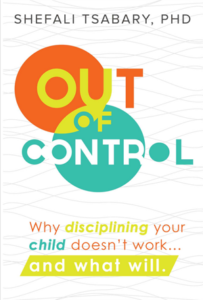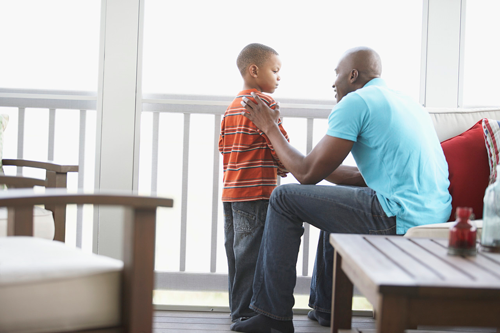As a mother and a writer who frequently covers child development issues, I’ve read countless parenting books filled with methods “guaranteed” to result in better-behaved children and a more peaceful, productive home. All of these titles are penned by experts who seem certain that their step-by-step strategies (and their strategies alone) are the key to raising happy, healthy kids—no matter what the individual personalities of those kids may be. But none of these calculated reward/punishment systems (which always seem to involve complicated sticker charts) has ever worked for me; in fact, they’ve always felt so contrived and counter-intuitive that I’ve never been able to fully implement any of them.
That’s why I was fascinated when I heard about the most recent book by Shefali Tsabary, Ph.D., Out of Control: Why Disciplining Your Child Doesn’t Work and What Will (Namaste Publishing). Also the author of The Conscious Parent: Transforming Ourselves, Empowering Our Children
(which Oprah calls the best book she’s read on parenting), Dr. Tsabary believes that traditional methods of discipline can be harmful to the parent/child relationship and that a more mindful approach has the potential to turn the “parenting journey” into a “spiritually regenerative experience for both parent and child.” Correspondingly, Out of Control focuses on how to forge an “ongoing meaningful connection between parent and child” that not only shows parents how to bring out the best in their kids but also inspires kids to naturally take responsibility for their actions.
 Having failed, as I said, at most of my previous, half-hearted attempts at conventional discipline, my response to this book’s premise was one of visceral relief and tentative hope. I’ve always felt, deep in my heart, that such customary consequences as time-outs and the taking away of privileges did little to teach my children any real “lessons” about whatever they had done “wrong”; instead, all these punishments ever seemed to accomplish was to slowly chip away at any existing sense of trust or mutual understanding between me and my kids. Maybe it’s because my children are both particularly sensitive types (like their mother), or maybe it’s because I’ve never been very good at following seemingly arbitrary rules myself, but Dr. Tsabary’s books are among the only parenting titles I’ve ever read that made any real sense to me. So I was thrilled to have the opportunity to ask her a few questions about Out of Control.
Having failed, as I said, at most of my previous, half-hearted attempts at conventional discipline, my response to this book’s premise was one of visceral relief and tentative hope. I’ve always felt, deep in my heart, that such customary consequences as time-outs and the taking away of privileges did little to teach my children any real “lessons” about whatever they had done “wrong”; instead, all these punishments ever seemed to accomplish was to slowly chip away at any existing sense of trust or mutual understanding between me and my kids. Maybe it’s because my children are both particularly sensitive types (like their mother), or maybe it’s because I’ve never been very good at following seemingly arbitrary rules myself, but Dr. Tsabary’s books are among the only parenting titles I’ve ever read that made any real sense to me. So I was thrilled to have the opportunity to ask her a few questions about Out of Control.
The chapter on “rescuing children” from the anxiety-producing consequences of their actions really resonated with me; I’ve fallen into this trap countless times with my kids. My question is regarding children who tend to be very anxious in general—how can parents tell the difference between “healthy” levels of anxiety and anxiety that merits further attention?
Parents are quick to rescue their children from unpleasant consequences because their own anxieties get triggered. In this process we shield our children from learning powerful life lessons. However, some children are overly anxious and require a different response from their parents. Such children are often acutely sensitive to failure and tend to be hard on themselves. For such children, the answer doesn’t lie in overly protecting them but instead in helping them de-stress through mindfulness training and other cognitive-behavior strategies. Parents need to be attuned to their children’s level of stress and titrate their exposure to the negative consequences of their behaviors accordingly.
I really appreciated your acknowledgement of “vibes”: how kids pick up on the energy produced by our subconscious patterns. But since untangling our own emotional patterns can be a lifelong process, how can we undo or move on from the damage we’ve already unwittingly done to our children? And what would you say to parents who suffer from depression or other disorders?
Each day offers an opportunity to correct and titrate our behavior toward our children. Yes, becoming conscious is a never-ending process, but small changes can produce big results. Parents can learn how to become more mindful by taking more pauses before they react and by learning to own their shortcomings instead of projecting them onto their children. For those parents who suffer from mental illnesses, it is best that they recognize their limitations and enlist the help of a professional to help them through their issues.
I also really appreciated your advice on the importance of allowing kids to feel sad—something that’s always been a challenge for me, as it triggers memories of my own sadness as a child (which went largely unnoticed by my mother). As with the anxiety question above, how can parents tell the difference between healthy and unhealthy levels of sadness?
Sadness that can be expressed and processed is often healthy. On the other hand, sadness that causes the child to withdraw from life and self-expression is a red flag indicating that the child does not feel safe and does not think his or her feelings will be honored and validated. Sadness, just like happiness, is a part of life and needs to be treated as a natural human emotion.
Thanks to Dr. Tsabary’s work, for the first time in a long time I feel energized about parenting in general. I feel like I’ve been given permission to honor the highly emotional nature of my relationships with my kids, rather than seeing our shared sensitivities as a disordered way of being. I feel empowered, at last, to honor my intuition. For that, I am sincerely thankful.
Click here to see Rose’s tips for healthy and happy relationships


